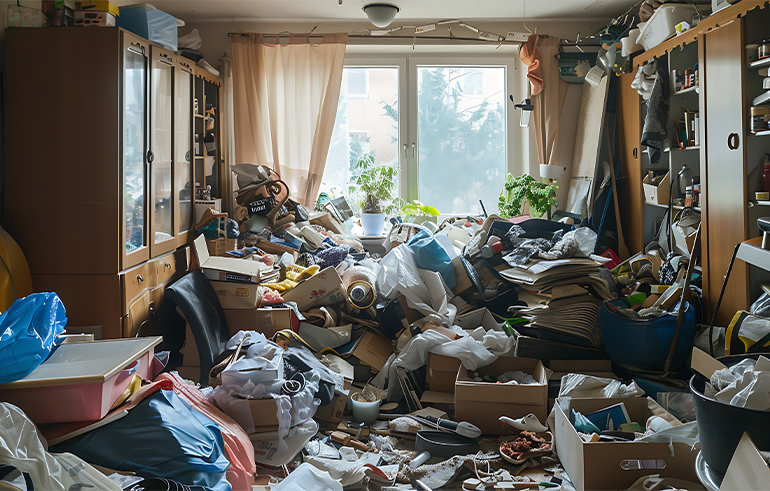- Address Av. Stalingrad 52 - 1000 Bruxelles
- Give us a call +32 486 735 880
- Opening hours 7 days a week | 24 hours a day

Issues and Cases of Diogenes Syndrome
Clutter and contamination are increasingly common problems in our societies, affecting both private and public spaces. These phenomena, often interconnected, can lead to unsanitary living conditions and significant health risks.
Definition of Clutter
Clutter refers to the excessive and disorderly accumulation of objects in a given space, making its normal use difficult. This accumulation can result from compulsive behaviors, neglect, or situations of poverty. Clutter can obstruct passageways, block access to emergency exits, and create areas where dust and dirt accumulate, thereby increasing the risk of fire and respiratory health problems.
Definition of Contamination
Contamination refers to the presence of harmful substances or pathogenic organisms in an environment, making it unsanitary and dangerous for human health. Sources of contamination can vary: chemical products, molds, bacteria, viruses, and other microorganisms. Contamination can occur due to lack of hygiene, ineffective waste management systems, or pest infestations.
Diogenes Syndrome
Diogenes syndrome is a behavioral disorder characterized by extreme neglect of personal and domestic hygiene, severe social isolation, and a compulsive tendency to accumulate objects. People suffering from this syndrome often live in severe clutter, which can lead to serious contamination situations. Their homes are often overrun with waste and debris, creating an environment conducive to the proliferation of pests such as rats, cockroaches, and other insects.
Issues Related to Pest Infestations
Clutter and contamination are often exacerbated by pest infestations. These infestations can occur when unsanitary conditions attract rats, mice, cockroaches, bedbugs, and other parasites. Pests can contaminate living spaces with their excrement, urine, and debris, posing serious health risks such as infectious diseases, allergies, and food poisoning.
Consequences and Solutions
The consequences of clutter and contamination can be severe, ranging from mental and physical health issues for affected individuals to environmental impacts and community risks. Solutions require a multidisciplinary approach involving social, medical, and environmental interventions. It is essential to implement effective waste management strategies, provide psychological support to individuals suffering from hoarding disorders, and ensure rigorous cleaning and disinfection procedures after pest infestations.
Professional Decluttering
Professional decluttering involves methodically and systematically removing excess objects from a space to make it functional and safe. Our decluttering professionals first assess the situation, sort the objects based on their utility and condition, and implement appropriate storage or disposal solutions. This process not only frees up space but also prevents risks associated with clutter, such as household accidents and health problems.
Professional Decontamination
Professional decontamination involves a set of procedures aimed at eliminating pathogens and harmful substances from an environment, whether residential, commercial, or industrial. Key steps in professional decontamination include :
Professional decontamination is essential to ensure a healthy and safe environment, particularly after incidents like pest infestations, water damage, or extreme situations such as Diogenes syndrome.
We operate in the provinces of Liège, Namur, Luxembourg, Walloon Brabant, and Brussels.